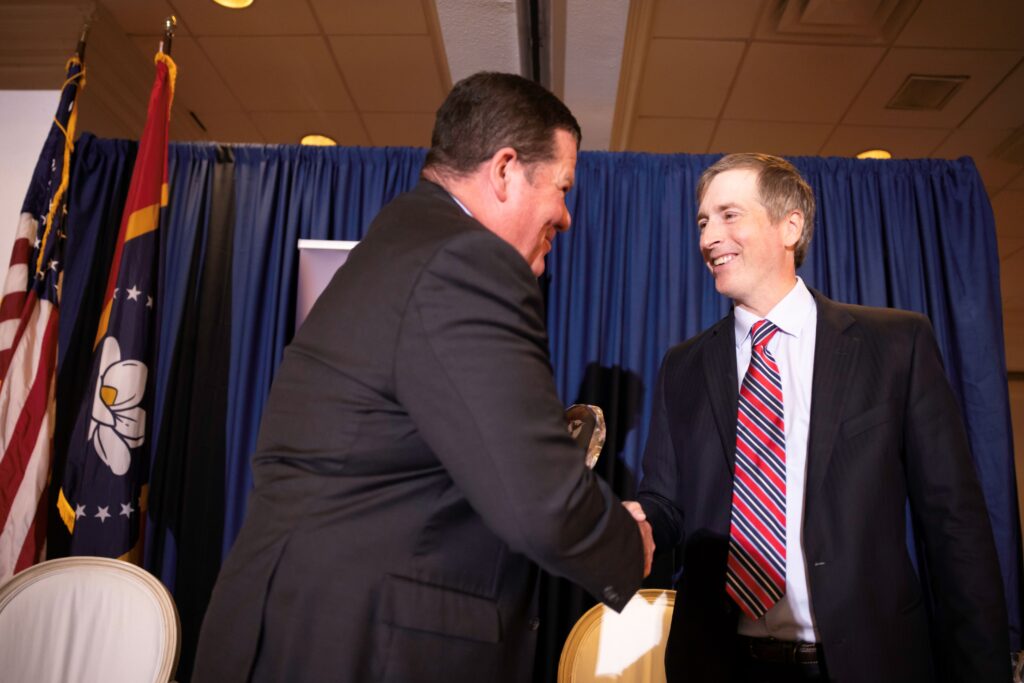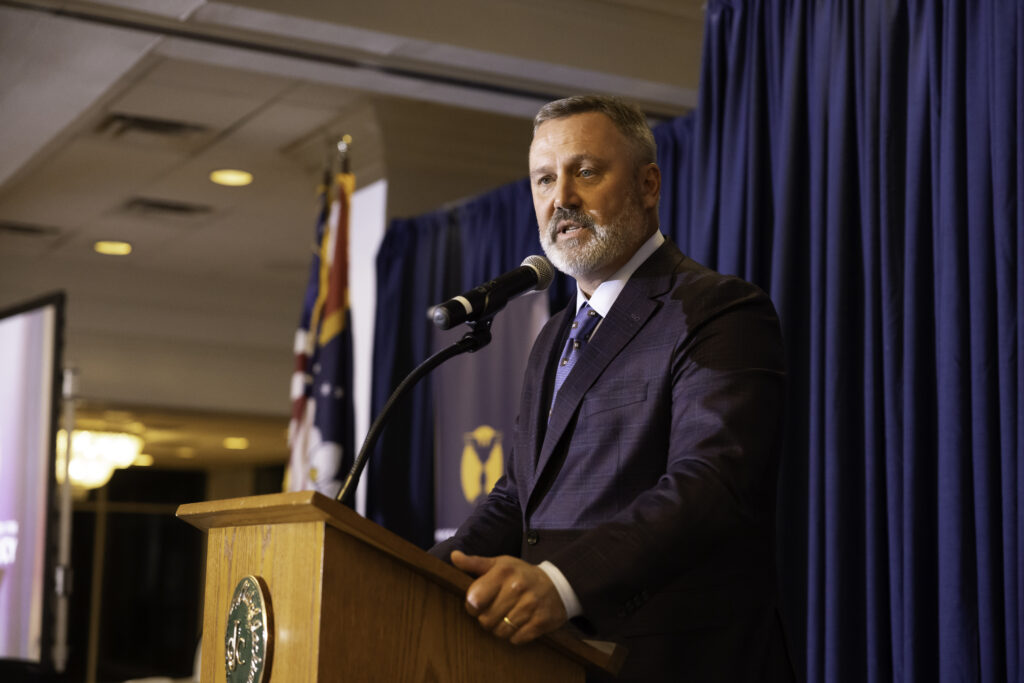The future for our state looks bright. In just the past five years, Mississippi has seen more economic growth than in the entire fifteen years before that combined.
We’re on track to phase out the state income tax entirely, allowing families to keep more of what they earn. Mississippi has attracted a surge of new investment, and for the first time in years, our workforce participation rate is finally heading in the right direction.
Zoom out, and the picture gets even better. Contrary to the endless gloom from the pundits, the American economy has consistently outperformed expectations for decades. Since the late 1990s, the U.S. has delivered strong, steady growth that few forecasters saw coming.
But there is one dark cloud on all our horizons that we cannot forever ignore; US national debt.
As of today, US national debt stands at $38 trillion (with a capital T).
To grasp how enormous a single trillion really is, try this:
- One million seconds ago was just last week, right before Halloween.
- One billion seconds ago was early 1994, when Clinton was president and the internet was dial-up.
- One trillion seconds ago was roughly 30,000 BC, deep in the Stone Age, when humans were still chasing mammoths.
Now here’s the gut-punch: that $38 trillion mountain of debt has roughly doubled in just the past ten years.
Costly foreign wars, mega bailouts, COVID giveaways and all those federal entitlement programs LBJ said would “end poverty”, eventually add up. (Incidentally, living standards for America’s poorest citizens are light-years higher than when those programs launched in the 1960s (indoor plumbing, air conditioning, smartphones, modern medicine), but the number of people dependent on government assistance is larger than ever).
Rather than pay for all that using tax receipts, the US government has borrowed, issuing IOUs. Today we spend more money servicing all those IOUs than we do on defense.
As my fellow Brit, the historian Niall Ferguson, likes to point out, any great power that spends more on debt servicing than on defense risks ceasing to be a great power. That was true of the Romans and the British, the Habsburgs and the Dutch.
What must America do to avoid a similar fate?
When President Trump was first elected, Elon Musk and Vivek Ramaswamy launched the Department of Government Efficiency (DOGE) with an ambitious target: to reduce annual federal spending by $2 trillion.
Because mandatory entitlement programs - Social Security, Medicare, and Medicaid - remained largely untouched, DOGE hasn’t come close to achieving that yet. The federal deficit has barely budged.
Where, one might ask, are all those Tea Party types that railed against federal overspending ten years ago as the debt to GDP ratio went from 90 percent in 2010 to 125 percent today?
If the US cannot rein in the growth of the debt, the only other way to avoid going the way of the Romans is to try to make the GDP part of the equation rise faster. In other words, to try to grow our way out of the debt.
In order to stabilize debt-to-GDP at the current 125 percent of GDP, America will need to achieve real GDP growth of about 4 - 5 percent for the next 10 to 20 years. With the advent of AI and robotics, as Elon Musk suggests, it could be done.
Put it another way; without an AI / Robotics induced growth surge, US debt will hit 150 – 170 percent of GDP by 2050. Mamdani-economics would then become the least of our worries, as inflation and tax rises became inevitable whoever held office.
The older I get, the more I think that there are two fundamental things that the federal government needs to get under control: mass immigration and the deficit. Do that, and states like Mississippi have a bright future. Don’t, and all the good that we might do will only matter at the margins.
FOR IMMEDIATE RELEASE
October 30, 2025
MISSISSIPPI CENTER FOR PUBLIC POLICY HONORS LEGISLATIVE HEROES AT ANNUAL GALA CELEBRATING STATE SUCCESS
JACKSON, MS – October 30, 2025 –Six of Mississippi’s leading lawmakers were presented with award to honor them for championing principled conservative policy. Rich Lowry, editor of the National Review, presented each of the winners.
Healthcare
Rep. Sam Creekmore and Rep. Hank Zuber were jointly honored for their leadership in challenging Mississippi’s Certificate of Need (CON) laws, which restrict the expansion of healthcare providers and limit patient access.

Countering DEI
Sen. Angela Hill received the award for her early and unwavering stand against the encroachment of divisive DEI (Diversity, Equity, and Inclusion) policies in Mississippi’s public universities. Long before the issue gained national attention, Sen. Hill worked to safeguard academic freedom and institutional integrity at the state’s flagship campuses.

Education Reform
Rep. Jansen Owen was recognized for leading the 2025 legislative effort to expand open enrollment through HB 1435. Though the bill passed the House with broad bipartisan support - uniting parents, educators, and lawmakers - it was ultimately blocked in the Senate.

Income Tax Elimination
Mississippi became the first state since Alaska in 1980 to phase out its personal income tax through HB1. Rep. Trey Lamar and Speaker Jason White were honored as the driving forces behind this transformative reform. Through public town halls, transparent negotiations, and superior policy arguments, the duo outmaneuvered opposition and delivered a pro-family, pro-growth tax cut that is already attracting investment and enhancing Mississippi’s competitiveness.“


These lawmakers represent the best of conservative leadership - courageous, principled, and effective,” said Douglas Carswell of the Mississippi Center for Public Policy. “Their work is making Mississippi a national model for freedom, opportunity, and common-sense governance.”
FOR IMMEDIATE RELEASE
October 28, 2025
Mississippi Center for Public Policy Celebrates Statewide Success with Governor Tate Reeves and National Review Editor Rich Lowry
Jackson, Miss. — October 28, 2025 — The Mississippi Center for Public Policy hosted its Celebration of Mississippi Success Gala on Thursday, October 23, at the Country Club of Jackson, honoring the state’s growing achievements in education, economic development, and freedom-driven policy.
Governor Tate Reeves joined Rich Lowry, editor of National Review, and Speaker of the House Jason White for an evening celebrating the policies and people shaping Mississippi’s future.
Governor Reeves spoke candidly with MCPP President and CEO Douglas Carswell about Mississippi’s remarkable economic momentum and the conservative principles guiding the state’s growth. Speaker Jason White outlined his vision for the 2026 Legislative Session, reaffirming that school choice remains his top priority for Mississippi families.
Lowry, a longtime advocate of federalism and American exceptionalism, delivered the evening’s keynote address, emphasizing that Mississippi’s success is a model for how pro-growth, pro-family policies can drive renewal in states across the nation.
“Mississippi is proving that conservative principles work — lower taxes, limited government, and personal freedom are creating real opportunities for families and businesses alike,” said Douglas Carswell, President & CEO of MCPP.
The gala brought together leaders from government, business, and civil society to celebrate the shared progress made toward a freer, more prosperous Mississippi.
For questions or inquires, please contact Anika R. Page at [email protected]




Remember the tariff debates that dominated Washington just a few months ago? For a while it was the only thing anyone seemed to talk about.
First tariffs were raised by eyewatering amounts. Then they weren’t. Eventually, after all sorts of back and forth, we saw tariffs imposed at the highest rates in decades. Free trade advocates warned of economic catastrophe, while protectionists claimed tariff revenue would fix the deficit. When immediate disaster didn’t strike, the issue seemed to fade – until now.
Two local stories that caught my eye this week suggest that we are going to hear a lot more about tariffs.
Agriculture is Mississippi’s largest industry, and soybeans the largest crop. Only a few days ago, U.S. Treasury Secretary Scott Bessent announced $10-15 billion in federal support for soybean farmers, including those in the Mississippi Delta. Why is the federal government having to support soybean farmers in one of the most fertile places in America? Exports have collapsed. China, which once bought over half our soybean crop, now purchases from Brazil due to steep retaliatory tariffs on U.S. soybeans, triggered by U.S. tariffs on Chinese goods.
In other words, federal funds are now bailing out farmers hurt by federal tariffs.
A second story that got my attention this week was about grocery prices. 53% of Americans say grocery costs are a major concern, with prices spiking last month at the fastest rate in three years. I couldn’t help also notice another news item about how coffee prices have jumped 20% in the past year, partly because of a 50% U.S. tariff on Brazilian coffee imports.
It is said that we often tend to overestimate the impact of new technology in the short term and underestimate the impact in the long term. I wonder if the same might be said of tariffs. The sky did not fall in when tariffs went up, but the lag effects of the historic hike are only just beginning to be felt by ordinary Americans.
There may yet be something in what the free traders keep trying to tell us. Defenders of free trade have been reluctant to speak up. I suspect that may be about to change. By the time of the midterm elections, I suspect millions of Americans will be feeling the effects of tariffs. Tariffs? We are going to hear a lot more about them than some people expect.
For Immediate Release
Jackson, MS – September 23, 2025 — Students from across Mississippi gathered in Jackson on Saturday for the opening session of the 2025 Mississippi Leadership Academy, a program that equips high school and college students with leadership training, civic knowledge, and direct access to state leaders.
This year’s kickoff featured State Auditor Shad White, Representative Rodney Hall, Americans for Prosperity Director of Grassroots Operations Stone Clanton, and Representative Chris Bell, who each shared their personal leadership journeys and engaged students in Q&A sessions.
“This program is designed to give young people the chance to think critically, ask tough questions, and walk away with skills that will serve them in whatever field they choose,” said Douglas Carswell, President & CEO of the Mississippi Center for Public Policy, which hosts the Academy. “The level of engagement we saw from these students gives me great hope for Mississippi’s future.”
The Academy brings together students from all over the state for two intensive Saturday sessions. In addition to leadership development and policy discussions, participants receive volunteer hour credit and opportunities to network directly with elected officials and community leaders.
The program will continue in October with a second session featuring additional speakers and interactive training opportunities for students.
Since its launch in 2021, the Mississippi Leadership Academy has seen strong results: more than one-third of past participants have gone on to internships with state leaders they first met through the program.


The past few days have been deeply unsettling. The assassination of Charlie Kirk, gunned down while addressing young Americans on a Utah college campus, was horrifying.
It seems clear that Charlie was targeted for his beliefs, which he expressed with remarkable clarity and conviction.
Over the past decade, Charlie Kirk emerged as one of a number of new conservative communicators who mastered digital media to connect with younger audiences who found traditional conservatism uninspiring.
Bold yet civil, Kirk fearlessly shared his views and welcomed open debate with those who disagreed. Tragically, it was during one such exchange that he was murdered.
The bleakness of the past few days has been amplified by a rush to vilify those on the “other” side. Where does this appetite for indignation that makes us want to always assume the worst about others come from? It risks driving us towards disaster.
Most liberals and progressives I know are as horrified about the events of the past week as my conservative friends. Yet, I fear that too many Americans have elevated politics to be a sort of substitute religion. It has become a belief system through which they try to make sense of the world. It won’t work.
When politics becomes your religion, you view those who share your beliefs as inherently good and those who don’t as inherently bad. This Manichean mindset erodes respect for differing opinions and abandons civility. Once you start to use your social media feed as the moral yardstick by which you judge the actions of others, you enter a world without redemption. It will be hell.
As a conservative think tank, the Mississippi Center for Public Policy relentlessly pursues practical solutions like eliminating income tax, cutting red tape, and expanding school choice to improve our state.
But what value do these victories hold if the next generation of Americans is indoctrinated with extreme ideologies? What good is tax reform today if young people are taught to see their country as irreparably beyond redemption; that only the darker parts of our history are to define us, and not the ideals of freedom that the Founders clung to?
Charlie Kirk understood the importance of teaching young Americans the principles that made the nation great. Through Turning Point USA, he educated students on freedom, free markets, and limited government.
We need to stand firm in our advocacy for these principles. Respectful but absolutely resolute.
Four years ago, we began the Mississippi Leadership Academy precisely because we recognized that shaping young hearts and minds is just as vital as pursuing legislative reform.
Our Mississippi Leadership Academy, which starts next week, is a two-part program designed to equip students with the skills and knowledge to become effective change agents in our state, ready to defend American principles and free markets. After this week’s events, the need for the Leadership Academy seems more urgent than ever.
It’s also why we run our Speaker Series, bringing leading advocates for liberty, such as Douglas Murray and Corey De Angelis to our state.
In the wake of this week’s tragedy, it’s understandable that some friends have felt despair. Two hundred forty-nine years after America’s founding, some may wonder, is this where our nation stands?
So let me say this as an immigrant that came late to your country; the United States is an extraordinary nation—the greatest republic in human history. America will remain great, able to overcome every challenge, as long as you hold fast to the founding principles and freedoms that built this nation.
Now more than ever, our mission must be to pass those principles on to the next generation.
This week, I’ll be traveling to Washington, D.C. talking about Mississippi’s remarkable progress, including our elimination of the income tax and how we might best advance school choice in our state.
Mississippi is gaining national attention for our transformative public policies. Once seen as a perennial underdog, our state is now recognized as a leader in free-market reforms that are driving unprecedented economic growth. A lot of folks in Washington and elsewhere are starting to notice our state for the right reasons!
Over the past five years, under Governor Tate Reeves’ leadership, we’ve achieved more economic progress than in the previous fifteen years combined, attracting massive investment. The folk making the decisions to put their dollars into our state know success when they see it.
This week, the Mississippi Center for Public Policy was honored with an award for our role in eliminating the income tax—a milestone in a series of reforms, including labor market changes in 2021, flat tax implementation in 2022, and school funding reforms in 2023.
As I said in my speech when I accepted the award on behalf of our Mississippi team, together these reforms make a potent policy combination. Click on the image below to hear what I said to the audience about Mississippi’s success story.

Now, we’re focused on the next critical step: school choice. Momentum is building, and there’s strong support from Team Trump, who see it as “the civil rights issue of our time.”
This week, two senior Trump administration officials, Deputy Assistant Secretary Laurie Todd-Smith and Deputy Chief of Staff Lindsey Burke, visited Mississippi to advocate for education reform before the House Select Committee on Education Freedom. Their compelling case was met with enthusiasm from parents, who outnumbered the entrenched status-quo lobbyists.
Mississippi is on the cusp of ensuring every family has access to the educational opportunities their children deserve. Your support is vital as we work to make school choice a reality.
Thank you for standing with us.
What would it take for Mississippi to embrace School Choice? How can we join our neighboring states in empowering families to control their child's share of the education budget? For School Choice to happen, we would need to see several steps.
Number one, we would need a committed Governor, ready to invest his political capital in this great conservative cause. Great news! This week, Governor Tate Reeves signaled in an interview with SuperTalk that School Choice will be his top priority for the 2026 legislative session.
Step two, we would have to have a supportive House Speaker. Once again, good news. This week, Speaker Jason White confirmed that the House is actively crafting legislation for 2026.
Thirdly, we would have to have strong grassroots support. Polling already shows that more than two-thirds of Mississippians support School Choice.
This week, Americans for Prosperity – Mississippi hosted an outstanding event in Jackson, led by the amazing Starla Brown. Speakers like Pastor Greg Divinity and Leah Ferretti powerfully articulated the moral imperative: Every family should have the choices that today are reserved only for the wealthy.
Fourth, it would be a big help to have the endorsement of Team Trump. Fantastic news on that front, too—having discussed this at the White House some time ago, it's evident to me that Team Trump is not just supportive; they're deeply passionate, viewing School Choice as "the civil rights issue of our time."
Fifth, if we are to allow families control of their child’s share of the budget, it would be helpful to know what “their share” consists of. Thanks to the 2024 school funding reforms, every child now receives a base amount of about $7,000 annually.
All we ask is that those who want to have that money paid into an Education Savings Account that they can then allocate to a school of their choice.
Finally, it would be tremendously helpful if those against School Choice endlessly resorted to misleading claims and hyperbole. I don’t think we’ll be disappointed there, either.
Claims that school choice would force your local school board to accept students from outside areas are simply untrue—and I believe many of those that suggest otherwise know it. Every proposal I’ve seen ensures school boards retain the final say on capacity.
As I learned from the Brexit campaign, dishonest claims from opponents only undermines the credibility of their campaigns. Having been able to rely on establishment opinion for too long, they’ve never mastered the art of making their case convincingly.
All the ingredients are there for Mississippi to adopt School Choice in 2026.
I’m thrilled to share that momentum for School Choice in Mississippi is growing! Governor Tate Reeves, Speaker Jason White, and even the White House are championing this transformative opportunity to empower parents and enhance education for our children.
This week, WTOK TV aired an in-depth segment exploring how School Choice could benefit families across our state. I had the pleasure of discussing this important topic with news anchor Anna-Hope Bigham. You can watch our conversation by clicking on the image below:

| Thank you for your continued support as we work to put parents in the driver’s seat of their children’s education. |
